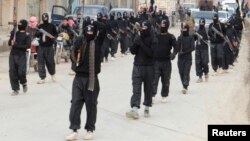ISTANBUL —
Turkish police and prosecutors are engaged in an increasing dispute with the government over the interception of alleged arms shipments to Syria. The government insists the authorities have no jurisdiction, but the revelation is putting Turkey's Syria policy under increasing political scrutiny.
In the past few weeks, Turkish prosecutors have intercepted several Turkish Intelligence Forces trucks that were suspected to be carrying weapons for radical Islamic groups in Syria.
Analyst Sinan Ulgen, a visiting scholar of Carnegie Europe, said these interceptions are a sign of growing divisions within the Turkish state over the government’s Syrian policy.
"This leak of intelligence was provided to the Turkish prosecutor who decided to stop this truck. But obviously, it is a sensitive issue and it shows that, unlike in previous times where the disagreement had at the rhetorical level, now it is starting to have a significance at the operation level," said Ulgen.
Defensive government
The government insists the trucks were only carrying aid. Opposition parties dispute this claim, however, demanding to know why the trucks were not allowed to be searched.
Ruling AK Party spokesman Huseyin Celik criticized the prosecutors for attempting to conduct searches.
The content of a truck belonging to the Intelligence Forces "does not concern anyone," he said, warning that the prosecutors who intercepted these trucks would be held accountable.
Pro-government media have accused supporters of the Muslim cleric Fetullah Gulen in the judiciary and police, of being behind the interception of the trucks.
Prime Minister Recep Tayyip Erdogan blamed the Gulen supporters for the launch of a series of high-level corruption probes last month. Gulen and Erdogan were once close political allies, but have since fallen out.
Questions abound
Observers point out that Turkey’s Western allies have become increasingly concerned over its stance toward radical Islamic groups fighting the Syrian regime. Ankara steadfastly claims it only supports the Free Syria Army.
Political analyst Cengiz Aktar of the Istanbul Policy Forum said, though, the increasing scrutiny will infuriate Ankara. "It is very annoying while Geneva 2 is under way in Montreux. It makes Turkish statements much less creditable in terms of interference in the internal affairs of Syria."
In the opening addresses of Montreux, the Turkish and Syrian foreign ministers exchanged angry barbs over accusations that Ankara is arming radical Islamic groups and Jihadists in Syria. Observers say such concerns also are likely shared by Turkey’s Western allies.
In the past few weeks, Turkish prosecutors have intercepted several Turkish Intelligence Forces trucks that were suspected to be carrying weapons for radical Islamic groups in Syria.
Analyst Sinan Ulgen, a visiting scholar of Carnegie Europe, said these interceptions are a sign of growing divisions within the Turkish state over the government’s Syrian policy.
"This leak of intelligence was provided to the Turkish prosecutor who decided to stop this truck. But obviously, it is a sensitive issue and it shows that, unlike in previous times where the disagreement had at the rhetorical level, now it is starting to have a significance at the operation level," said Ulgen.
Defensive government
The government insists the trucks were only carrying aid. Opposition parties dispute this claim, however, demanding to know why the trucks were not allowed to be searched.
Ruling AK Party spokesman Huseyin Celik criticized the prosecutors for attempting to conduct searches.
The content of a truck belonging to the Intelligence Forces "does not concern anyone," he said, warning that the prosecutors who intercepted these trucks would be held accountable.
Pro-government media have accused supporters of the Muslim cleric Fetullah Gulen in the judiciary and police, of being behind the interception of the trucks.
Prime Minister Recep Tayyip Erdogan blamed the Gulen supporters for the launch of a series of high-level corruption probes last month. Gulen and Erdogan were once close political allies, but have since fallen out.
Questions abound
Observers point out that Turkey’s Western allies have become increasingly concerned over its stance toward radical Islamic groups fighting the Syrian regime. Ankara steadfastly claims it only supports the Free Syria Army.
Political analyst Cengiz Aktar of the Istanbul Policy Forum said, though, the increasing scrutiny will infuriate Ankara. "It is very annoying while Geneva 2 is under way in Montreux. It makes Turkish statements much less creditable in terms of interference in the internal affairs of Syria."
In the opening addresses of Montreux, the Turkish and Syrian foreign ministers exchanged angry barbs over accusations that Ankara is arming radical Islamic groups and Jihadists in Syria. Observers say such concerns also are likely shared by Turkey’s Western allies.




